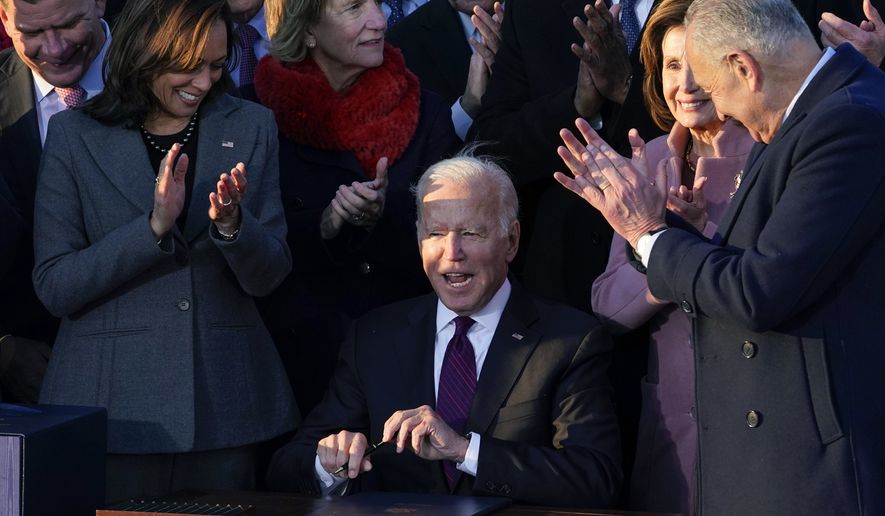President Biden signed his $1.2 trillion bipartisan infrastructure package into law on Monday, opening up federal funds for railroads, bridges, mass transit, broadband and utilities.
“For too long, we’ve talked about having the best economy in the world,” Mr. Biden said at a White House signing ceremony on the South Lawn. “We’ve talked about asserting American leadership in the world with the best and safest roads, railways, ports, and airports. But today, we are finally getting it done.”
“And my message to the American people is: America is moving again. And your life is going to change for the better,” he said.
The measure was approved by the House on Nov. 6 after months of feuding between moderate and progressive Democrats over the fate of the administration’s companion $1.75 trillion social-welfare package.
The infrastructure measure will fund more than $550 billion of new spending on America’s infrastructure over the next five years. It will include $110 billion for roads, bridges, and other projects, $66 billion for freight and passenger rail, including upgrading Amtrak, and pumping $39 billion into public-transit systems.
Another $65 billion will be directed toward expanding broadband access in low-income neighborhoods and an additional $55 billion will go toward improving local water systems and replacing lead pipes.
SEE ALSO: White House skips introduction of ‘key partner’ Kamala Harris at bill signing
The bill also devotes $7.5 billion to building a nationwide network of electric-vehicle chargers.
“This law makes the most significant investment in roads and bridges in the past 70 years and makes the most significant investment in passenger rail in the past 50 years and in public transit ever,” Mr. Biden said.
While funding will be doled out over five years, it could take months or years for most of the major projects to start.
First passed by the Senate in a 69-to-30 vote in August, the infrastructure bill was ultimately passed by the House — including 13 Republican lawmakers — after months of Democratic infighting.
The ceremony marks a major legislative win for Mr. Biden as his poll numbers continue to dive ahead of the midterm elections, and a brutal showing in two governor’s races earlier this month.
Voters remain angry over the administration’s handling of the COVID-19 pandemic and rising inflation. An ABC-Washington Poll poll released Sunday said 41% approve of the job Mr. Biden is doing, while 53% disapprove.
Mr. Biden will next head to New Hampshire and Michigan this week to tout his infrastructure plan.
About 800 guests attended the signing ceremony, including lawmakers of both parties, mayors, state and local elected officials, labor leaders, businesses leaders and others.
Mr. Biden also invited several Republicans to promote bipartisanship as he pushes Congress to pass his massive $1.75 trillion economic spending bill. That bill, the second pillar of Mr. Biden’s economic agenda, would expand the social safety net and fund initiatives to fight climate change.
Republican Sens. Lisa Murkowski of Alaska, Susan Collins of Maine, Rob Portman of Ohio and Bill Cassidy of Louisiana all attended, along with at least two Republican House members.
Also in attendance were Democratic Sens. Joe Manchin III of West Virginia and Kyrsten Sinema of Arizona, two key holdouts on Mr. Biden’s economic bill.
Ms. Sinema and Mr. Portman, who helped negotiate the bipartisan agreement on the infrastructure bill, both spoke at the ceremony.
“Our legislation represents the substantive policy changes that some have said are no longer possible in today’s Senate,” Ms. Sinema said.
Other Democrats who attended the ceremony included Senate Majority Leader Charles E. Schumer of New York and House Speaker Nancy Pelosi of California.
Senate Minority Leader Mitch McConnell, Kentucky Republican, voted for the bill but did not attend the signing ceremony.
• Jeff Mordock can be reached at jmordock@washingtontimes.com.




Please read our comment policy before commenting.